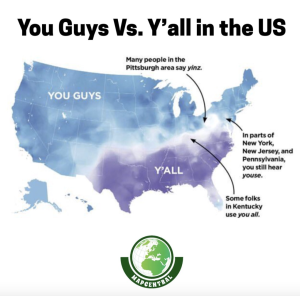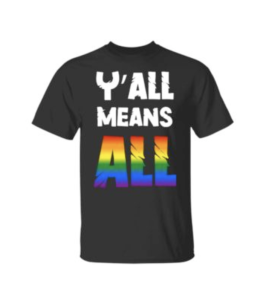5CA. Address Forms & Pronouns Corpus Activity
Robert Poole
Pronouns and inclusive language use: The case of ‘you guys’ and ‘y’all’
This activity is designed to match the content in 5. Address forms & pronoun choice and for use with the Corpus of Contemporary English. If you’re not familiar with the basics, be sure to do C. Introduction to Corpus Analysis first.
Linguists typically consider pronouns to be a closed class. While we add new nouns, verbs, and adjectives to the lexicon frequently and easily, it is much less common for additions to appear in closed classes such as pronouns. However, change in this class does occur. For example, English once had two second-person forms (‘thou’ and ‘you’), but over the years, ‘thou’ has essentially been removed from language use. More recently, as we strive for greater inclusivity, gender-neutral pronouns (e.g., ‘ze’ and ‘zie’) have been introduced as alternatives to the masculine-feminine gender binary and the singular use of ‘they’ has become increasingly common.
In this section, we will explore the use of two second person plural pronouns: ‘you guys’ and ‘y’all’. Let’s first reflect upon our use of ‘you guys’ and ‘y’all’ as second person plural pronouns used to refer to a group of people. Consider the following questions:
- Do you feel you more frequently use ‘you guys’ or ‘y’all’ in your spoken language use?
- Are there reasons that inform your choice to use either ‘you guys’ or ‘y’all’?
- Do you feel either of the terms is problematic?
- Do you feel your use of these two pronouns has changed in recent years?
- Are there alternatives to ‘you guys’ or ‘y’all’ that you use, hear, or feel should be adopted?
It is possible, even likely, that you have heard or read that some view ‘you guys’ as problematic for it ascribes a masculine identity to all in a group despite how those individuals may identify. If ‘you guys’ is problematic, which does seem a valid argument, it leaves English language users with a gap in their language system. More simply, if people wish to stop using ‘you guys’, then what will they or should they use in its place?
If you have time and interest, read ‘Guys’ is not gender-neutral—let’s stop using it like it is by Amy Diehl at Fast Company:
- https://www.fastcompany.com/90629391/guys-is-not-gender-neutral-lets-stop-using-it-like-it-is
One potential alternative to ‘you guys’ is the term ‘y’all’, most commonly associated with Southern American English. As the following map demonstrates, the use of ‘you guys’ and ‘y’all’ is divided clearly by an isogloss. An isogloss is a term used by applied linguists to refer to the geographical boundary that indicates on one side of the boundary speakers are likely to use one word while on the other the preference is for an alternative term. In this discussion, we will explore these two terms, their use and utility in contemporary language use, and consider whether these terms should be critiqued and removed or praised and promoted.

Southern American English is perhaps the most frequently ridiculed regional variety of US American English. Indeed, speakers with a Southern accent often face some rather harsh stereotypes and judgments. Likely the most recognizable and frequently noted distinguishing feature of Southern English is the “Southern Drawl”. This elongation is what prompts the perception that Southerners speak more slowly than speakers from other regions. There is also the production of the “I” sound that diverges from other regions, and word stress patterns that are distinct as well. Perhaps the most recognizable feature of Southern English is the use of ‘y’all’.
‘Y’all’ is the contracted form of you and all and serves as a second person plural pronoun for speakers of Southern English. It can commonly be heard as a greeting, “How y’all doing?” or in ways reflective of the region’s hospitality, “Y’all doing ok?”, “Y’all alright?” or “Y’all need anything?”. While ‘y’all’ has been a noticeable marker for a stigmatized variety, this corpus activity asks: “Is the word ‘y’all’ having a moment?”.
This corpus activity explores whether ‘y’all’ is actually growing in use in recent years, as it presents a rather inclusive alternative to ‘you guys’. Additionally, it seems possible that ‘you guys’ is falling in use, for it inaccurately applies one gender identity on a mixed-gender group, thereby erasing the preferred gender identity of people in the group.
For the activity, we will collect data on the use of ‘you guys’ and ‘y’all’ in the Corpus of Historical American English.
- Go to english-corpora.org/coha/, click the Chart search option, and enter ‘you guys’ in the search bar. Record the per million (per mil) data for each decade in the table below.
- Repeat the search process from step #1 with ‘y’all’.
| TABLE 1 | 1950 | 1960 | 1970 | 1980 | 1990 | 2000 | 2010 |
| you guys | |||||||
| y’all |
Before reaching any conclusions and forwarding statements about the use of the two items, let’s also collect data on their frequencies of use in the Corpus of Contemporary American English. While COHA provides a useful overview, COCA is a much larger corpus, has greater balance across registers (much of COHA is from fiction), and is more narrowly focused on contemporary language use–COCA includes language use from 1990-2019.
- Go to english-corpora.org/coca/, click the Chart search option, and enter ‘you guys’ in the search bar. Record the per million (per mil) data for each five-year period in the table below. Complete the process once again with ‘y’all’.
| TABLE 2 | 1990-94 | 1995-99 | 2000-04 | 2005-09 | 2010-2014 | 2015-2019 |
| you guys | ||||||
| y’all |
A cursory view of the data indicates that ‘y’all’ does seem to be holding steady across the six time periods captured in COCA in comparison to ‘you guys’. Even though Southern English attracts negative judgments, the use of ‘y’all’ has not declined. It is not possible to declare that ‘y’all’ has overtaken ‘you guys’, but this trend will be an interesting one to monitor in the future. It is important to note that COCA does not yet include data after 2019, so it is possible that the next update to COCA will reveal a greater shift. It is possible that the actions such as those described in the next section will influence trends in use.
Y’all means all!
It seems cultural shifts and recent events potentially indicate greater use of ‘y’all’ and less frequent use of ‘you guys’ in the coming years. Besides the general pushback against ‘you guys’, the Southern Poverty Law Center in 2020 launched the “Y’all Means All” movement to promote greater inclusivity and support for the LGBTQ+ community. The civil rights-focused legal advocacy group asked all to pledge “to reject white supremacy and show your support for our shared vision of uplifting LGBTQ people in the Deep South” (splcenter.org). Across the southern US, “Y’all Means All” stickers, signs, flags, t-shirts and more have started appearing. For example, check out the t-shirt from the clothing company One Rockin.

It does seem that ‘y’all’ is having a moment and may indeed grow increasingly frequent. Perhaps it will break through the historically-rigid isogloss that saw its use constrained to the southern US, and that this one-time marker of a stigmatized regional US English will become commonplace in US American language use. Consider the following questions:
- If you were to make a prediction, what do you think will occur with the use of these two second person plural pronouns in the next 5, 10, or 15 years?
- What do y’all think, is ‘you guys’ sexist?
- Is ‘y’all’ the inclusive second person plural pronoun that English needs? What other options are there?
- Are you more likely to use ‘y’all’ now than you were before? Why or why not?
Module author: Robert Poole
Last updated: 21 November 2022
This module is part of Critical Language Awareness: Language Power Techniques and English Grammar, an open educational resource offered by the Clarify Initiative, a privately funded project with the goal of raising critical language awareness and media literacy among students of language and throughout society.



